In her last years Elisabeth de Waal was adamant: “I don’t miss Vienna,” she would say, “it was very claustrophobic. It was very dark.” Born Elisabeth Ephrussi in 1899, and having spent her early years in the sumptuous Palais Ephrussi, she left Vienna in 1924 for the United States before moving in 1928 to Paris where she lived for ten years with her Dutch husband, Henrik de Waal. In 1939, after Hitler’s invasion of Austria, but before his troops marched into France, the de Waals left Paris for England. They settled in Tunbridge Wells, where she died in 1991, having spent almost three-quarters of her life, one might say, in exile.
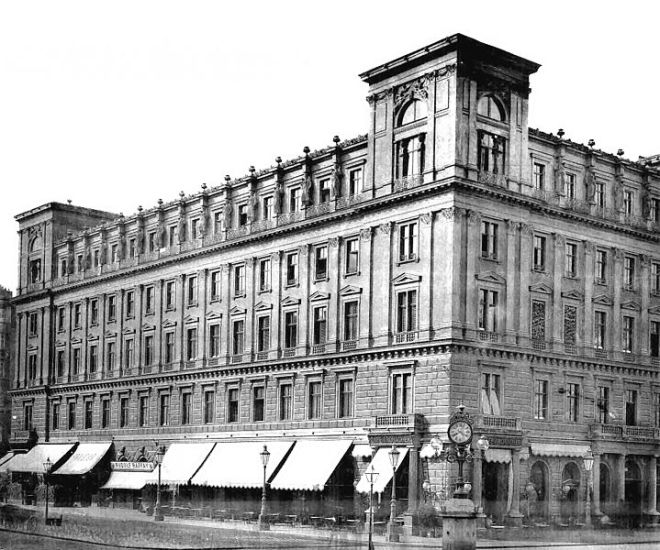
She never lived in Vienna again, but she did visit, returning for the first time after the war to see what remained. She found her childhood home stripped of all but the heaviest furniture; a few pictures remained on the walls, a few scattered vases and some rugs on the floor; the Palais Ephrussi had been taken over by the American occupying authorities, its once elegant rooms turned into offices.
Having been marched over by Hitler’s armies, Austria had been subjected to Allied bombing and the war which had destroyed so many buildings in Vienna, and in the villages, had also shaken the foundations of the aristocracy. In The Exiles Return Elisabeth de Waal paints a disturbed society in which a princess must take work as a laboratory assistant; the grand-daughter of a prince is courted by the grandson of his gamekeeper; a scion of the eye-wateringly wealthy Greek community turns for property advice to a successful estate agent, previously his father’s bailiff; and a fifty year-old professor must defer to a young ex-Nazi. Social barriers had collapsed. The country was rebuilding itself.
Arriving in the Spring of 1954 at what had been Vienna’s elegant Western Station, Professor Kuno Adler is shocked to find nothing but an open space. Concrete mixers and steel girders stand ready: a new modern station is under construction. European long distance rail services had only recently been re-established. He is returning to Vienna after fifteen years in the United States, leaving behind his daughters and a fractious marriage. Before the War, the city’s Jewish population had numbered more than 185,000. By 1931 130,000 had left. Of those who remained barely more than 2000 survived the Holocaust. Kuno Adler, a Jew, had been wise to choose exile. But is he wise to return? The city to which he moved from Moravia as a boy, that great glittering magnet, drawing in Czechs and Poles, Croats, Magyars, Italians and Jews, which he nursed in his memory for so many years, is quite changed. “I shall have to learn the lesson of Western Station,” he thought, “Would the lessons be very hard? Had he been wise in undertaking to learn them?” Just how hard is it for an exile to return?
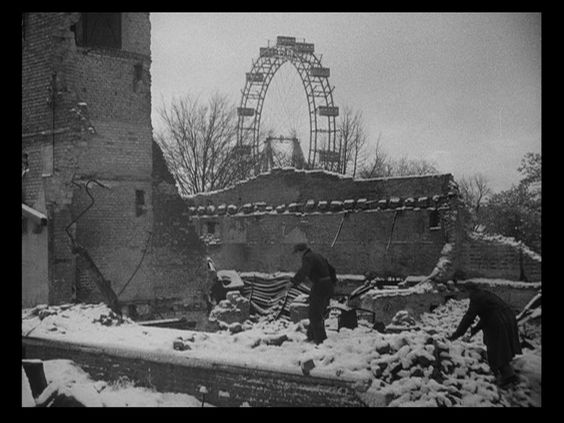
In so far as he left Austria before Hitler’s armies marched in, and was not forcibly dismissed, Professor Adler is in a more difficult position than the Jewish antique dealer deprived of his shop and all his stock, and forced into exile, thereby qualifying for ‘restitution’. Herr Castello has recovered his premises, though not his stock, which has been ‘dispersed’ (i.e. stolen, appropriated, looted – language, as always, is also a victim of war). Costello is able to trade again. The Professor returns to work in his old laboratory, but must accept a lowly position. The directorship of the Institute which was destined for him fifteen years earlier has been given to a ‘cleansed’ Nazi sympathiser. But Kuno Adler, though not fully resigned to his situation, is nonetheless a patient man, ready to reflect on his status, prepared to work at belonging once again in his own country. To reconnect with his roots he walks in the city, in the suburbs, in the surrounding villages, letting time pass before risking any attempt at renewing old friendships, content for the time being to have been welcomed ‘home’ by the old caretaker at the Institute. ‘He was lonely, but he was coming to terms with his loneliness, which was of a different kind from the loneliness he had experienced in exile.’ Of all the exiles in the novel, although he can never quite escape accusations of aloofness, a manifestation perhaps of his loneliness, only Kuno actively reflects on his status, and adapts to it.
Like Adler, Theophil Kanakis has returned from America. However, Kanakis is not Jewish but Greek, part of the same small, extremely wealthy community which included the Ephrussis. Having left Vienna not to avoid persecution but to increase his already large inherited fortune, the property developer’s dream is to find the perfect ruin, a small eighteenth-century palace to restore to its former glory. The destruction of Vienna, which causes Adler so much sorrow, for Kanakis represents an opportunity. He foresees no problem in re-establishing himself: once he has filled his palace with beautiful things, he will have no difficulty filling it with beautiful people. So long as he can attract guests, he doesn’t need friends. Brimming with self-assurance, he has no reason to assume a protective cloak of aloofness: ‘he had no ambition to “cut a figure” either in politics, in industry or even in the cultural life of the country to which he had temporarily returned.’ The italics are mine. Kanakis’s immense wealth will allow him to move on again, and again. Nebulous notions of ‘home’ need not concern him. He is both a serial exile, and a citizen of a small worldwide, borderless, community, that of the very, very rich.
In addition, bravely for the period, Elisabeth de Waal makes him a sexual outsider. Kanakis is homosexual, an exile from the ‘norm’, from conventional respectability. But the homosexual community itself offers a kind of solidarity, a ‘home’. It is not entirely by chance that he falls in love in Costello’s treasure trove of objets d’art, where he glimpses an exquisite young man holding an equally exquisite porcelain shepherdess – a brilliant scene, in which the reader is momentarily left to discern whether it is the figurine which has triggered the coup de foudre, or the slight but perfectly proportioned youth, with the head of a young faun, Prince Lorenzo Grein-Lauterbach, appropriately nicknamed Bimbo.
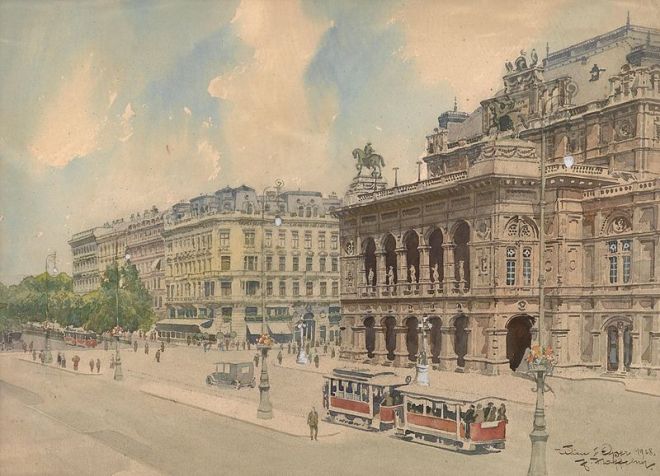
Arrested not for their Jewishness, but for their anti-Fascist views, and ransom potential, Bimbo’s parents had been among the first victims of Nazi oppression. The family properties and fortune were confiscated, Bimbo and his sister, smuggled out of Vienna by the family priest, to spend the war hiding in the Austrian countryside – internal exile. Like the other exiles in the novel, the young Greins have returned to rebuild their lives in the city, where Bimbo, cynically trading on his looks to survive, dreams of retrieving the family schloss, while his older sister, stocky, plain, and over thirty, takes a menial job, and accepts her changed circumstances – from Princess to Fraulein.
The novel’s saddest exile is the youngest, Marie-Theres, ‘Resi’ Larsen, daughter and niece of Countesses, granddaughter of a Prince. Taken as an infant from Vienna to the United States by her parents, unlike them and her younger siblings she has never fitted in, and was unable to put down roots. Her mother, a happy chameleon, adapts to each new neighbourhood and social group, looking forward to rising through the socio-architectural strata of their Boston suburb, from the closely-clustered ranch-style houses with low shrubs on the lower slopes of Eden Rise to the spacious homes with swimming pools and trees on the heights – de Waal is brilliant at capturing the spirit of a place, however dull. The Countess finds her oldest child a source of irritation. Resi has no friends, she shows no interest in mixing with others or in conforming, and her remarkable good looks (and she knows she is beautiful) set her still further apart. Resi’s American schoolmistress describes her as surrounding herself ‘with a kind of vacuum which she allowed no-one to penetrate’. Her mother’s selfish, cruel and ultimately disastrous solution is to exile her once more. She sends her back to Vienna to stay with her aunts, which for a while seems to offer some comfort, particularly to her mother, but when one of her cousins suggests that she join a university course to meet other foreigners, she replies, “I don’t make friends”. Little has changed.
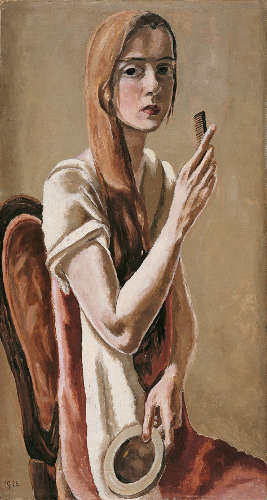
Self-portrait by Marie-Louise von Motesiczky
I have been unable to find a one-word antonym to exile. The term most frequently used in The Exiles Return is ‘at home’. Nowhere, even in her own home, even in her own skin is Resi ‘at home’. She dreams of belonging, but it is a dangerous fantasy. Resi’s quest is doomed. De Waal describes her on several occasions as stepping into ‘another country’, a metaphor she doesn’t use for the other exiles. Taken by her cousins to one of Kanakis’s parties (ironically referred to as ‘at homes’), she finds his palace to be ‘a strange country’, ‘the country of romance, for which, in the boredom of her adolescence, she had secretly yearned but had never been able to envisage’. Meeting Bimbo Grein for the first time, she enters ‘an unknown country’: it doesn’t occur to her that she might be in enemy territory.
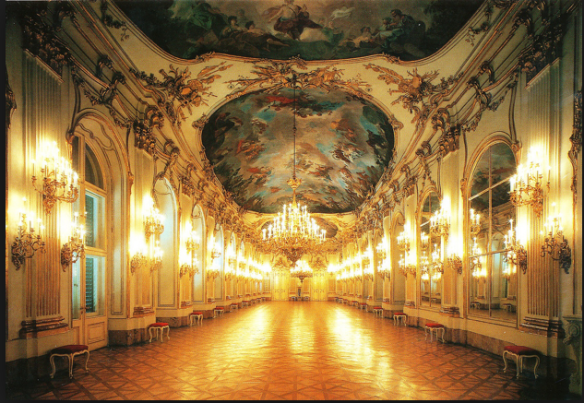
‘She felt that this was where she belonged, a dream come true, a fairy tale in which she herself was the princess.’
There is one more exile in the novel, in the shadows, but a powerful presence, Elisabeth de Waal herself, whose nostalgia for lost places, trees, hills, sights and smells pervades the most lyrical passages in the novel, introducing shafts of light into the strangely dark atmosphere of a wounded city still in recovery, while she asks us to reflect on the very nature of exile. Does exile necessarily mean leaving one’s country? Or leaving one’s city? One’s family? Where and when does exile begin? Is it possible fully to return? Are some people born exiles? Never ‘at home’? Are others ‘at home’ anywhere, members of a wider tribe unbound by national, racial or familial boundaries?
It is calculated that at the end of the last war there were over 40 million uprooted people in Europe – 40 million exiles – a shocking figure, until we read that last year, for the first time, the number of refugees worldwide passed the 60 million mark. According to the UN annual report marking World Refugee Day, on average 24 people were displaced from their homes every minute of every day during 2015, an average of 34 000 per day.
When Elisabeth de Waal’s grandson, Edmund de Waal, the potter, and author of The Hare With Amber Eyes, read the typescript of her as yet untitled novel (hard to believe – The Exiles Return encapsulates it so perfectly), he feared that it might be unpublishable. ‘The rawness of emotion”, he wrote, ‘makes for uncomfortable reading’. It does. And rightly so. Fortunately for us he was wrong about its being unpublishable.